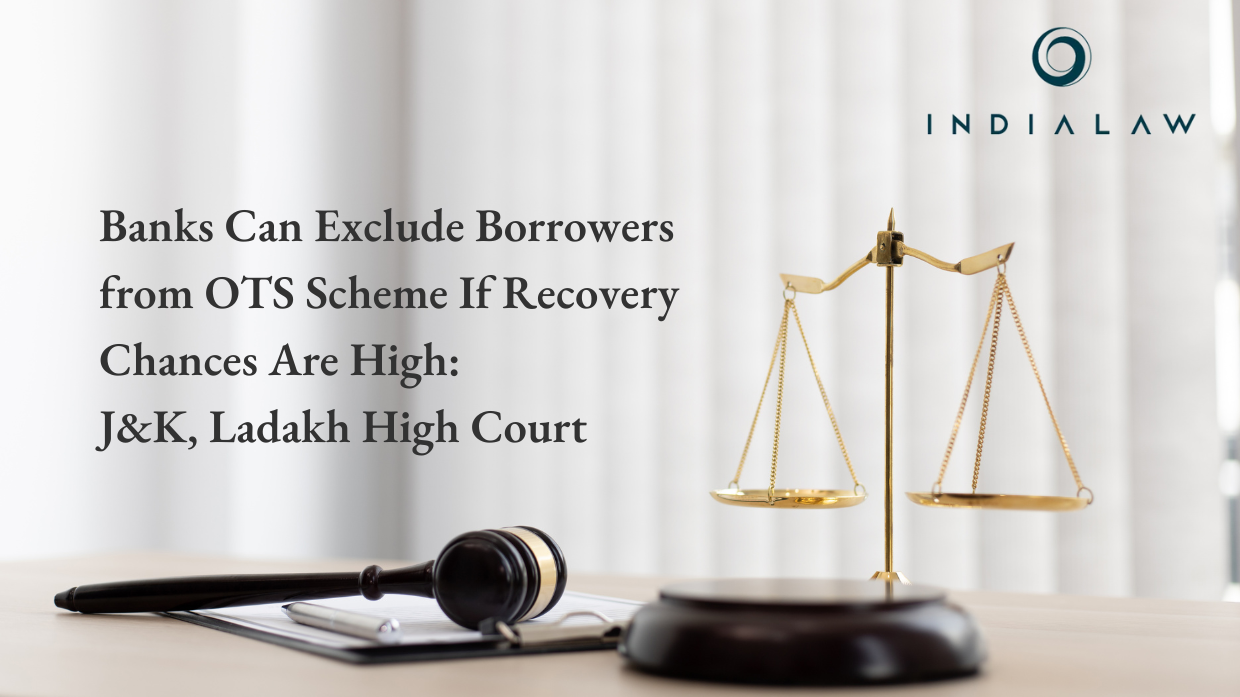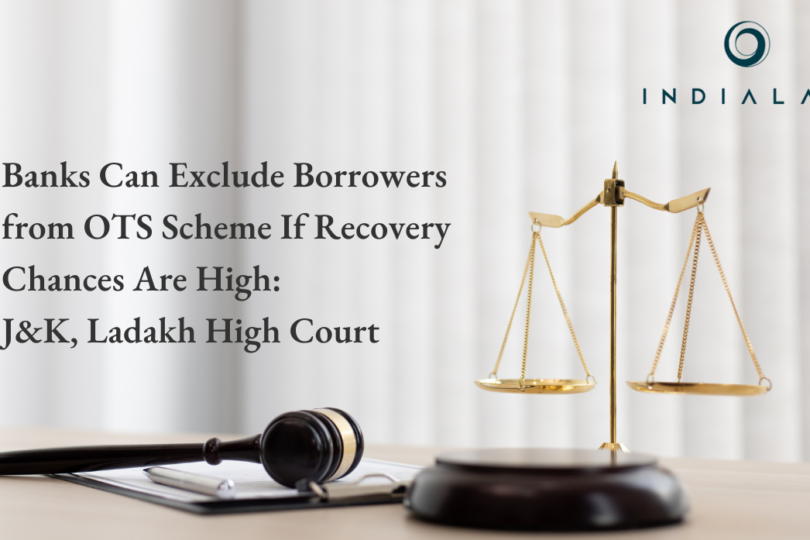
Wednesday May 31, 2023. BY Malavika Sachin, Abdullah Qureshi, Shradha Patil | Debt Recovery
The Hon’ble Single Judge Bench of Jammu & Kashmir and Ladakh High Court, comprising of Justice Sanjay Dhar in Ghulam Ahmad Mir Vs J&K Bank & Ors.[i]vide order dated 26th April 2023 held that a banking institution has the liberty to make policies and issue guidelines to differentiate the cases of those borrowers where the chances of recovery are bright from those where the chances of recovery are bleak.
Facts Of The Case:
The Petitioner obtained a composite loan facility from the Respondent Bank for an aggregate amount of Rs. 9,24,35,000/-. The said loan facility was classified as a non-performing asset on 31.12.2019 and a notice under Section 13(2) SARFAESI Act was issued by the Respondent Bank against the Petitioner. An amount of 7,86,88,082.94/- was stated to be outstanding as per the aforesaid notice.
The Petitioner had been attempting to negotiate and settle the financial claim with the Bank in terms of the scheme of the Reserve Bank of India. The Petitioner initially offered a settlement amount of Rs.4.90 crores, which was later increased to Rs.6.80 crores on 21.03.2022. However, instead of accepting the offer, the bank initiated recovery proceedings under Section 14 of the SARFAESI Act.
The Bank did not act on the proceedings, and subsequently, a revised Onetime Settlement Policy, called J&K Bank’s Special Onetime Settlement Scheme for NPAs, 2022, was introduced. As per this scheme, NPA accounts with outstanding of Rs. 15 lakhs up to Rs. 10 crores as of 30.06.2022 were covered. However, as per the covenants of the said scheme, compromise cases under process where the offer amount exceeds the prescribed OTS amount were made ineligible under the scheme. Relying on this provision, the Bank rejected the Petitioner’s request for a one-time settlement under the scheme.
Findings Of The Court:
Upon perusal of the covenants of J&K Bank’s Special Onetime Settlement Scheme, the Hon’ble Court observed that the same is non-discretionary and non-discriminatory in nature. The scheme applies to all non-performing assets (NPAs) with outstanding balances ranging from Rs.15.00 lacs to Rs.10.00 crores as of June 30, 2022. However, certain categories of cases are explicitly excluded from the scheme.
The Court further held that a Financial Institution, such as the Respondent Bank, has the authority to exclude a specific category of borrowers from a scheme if it deems it necessary for the overall financial well-being of the institution. The Court emphasized that a banking company has the liberty to establish policies and issue guidelines to differentiate between borrowers with higher prospects of recovery and those with limited chances of recovery. Merely because a banking company formulates a scheme that excludes Borrowers with high chances of recovery, it does not necessarily imply discrimination against the excluded borrowers.
The Court observed that a Bank is justified in denying the benefits of the OTS Scheme to a specific category of borrowers if it believes that recovery of dues can be achieved through the sale of the mortgaged property or if there are greater prospects of recovery while considering the borrower’s financial health.
While referring to the case of The Bijnoor Urban Cooperative Bank Limited, Bijnor & others vs. Meenal Agarwal & others,[ii] the Hon’ble Court held that it is evident that the grant of benefits under the One-time Settlement Scheme is contingent upon meeting the eligibility criteria outlined in the scheme. Furthermore, it is presumed that a Bank will exercise prudence when determining whether to include a specific category of borrowers in the OTS Scheme, taking into account the public interest involved. Thus, the burden of proof to establish that they have been subjected to unfair discrimination lies with the individual contesting an OTS scheme’s guideline or covenant that excludes them.
It was further noted that, in fiscal matters, the Courts generally refrain from intervening in the exercise of the power of judicial review. The expertise and conclusions of finance and banking experts cannot be substituted by the Court’s own views. Interference through writ jurisdiction is only justified if it can be demonstrated that a banking company’s decision is illegal or perverse. Since the Petitioner has failed to establish such a case, there is no need for the Court to intervene regarding the challenged covenant of the OTS Scheme, 2022.
The Ld. Senior Counsel appearing for the Petitioner placed heavy reliance upon the Hon’ble Supreme Court judgment in Sardar Associates & Ors. Vs. Punjab & Sindh Bank and others,[iii]The Hon’ble High Court noted that in the aforesaid case, the Bank made an offer for settlement under the Scheme, to which the Borrower responded, and the Borrower’s proposal was within the guidelines issued by the Reserve Bank of India.
In the present case, the Respondent Bank never made an offer to settle the Petitioner’s accounts under the OTS Scheme, 2022. Rather, the Respondent Bank made an offer under the General OTS Scheme, to which the Petitioner submitted his proposal, and the same is under consideration by the Bank. The Hon’ble High Court observed that the facts of the case cited by the Petitioners are clearly distinguishable from the facts of the present case, and hence not applicable in the present circumstances.
In the present case, the Hon’ble High Court held that the exclusion clause in the OTS Scheme, 2022, is not discriminatory. Therefore, the Petitioner’s case is not covered under the scheme, and the Respondent Bank was justified in rejecting the Petitioner’s request for consideration under the scheme.
Accordingly, the Writ Petition was dismissed.
[i] WP(C) No. 526/2023
[ii], (2023) 2 SCC 805
[iii] (2009) 8 SCC 257
